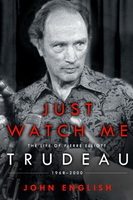He infatuates us still.
At least a dozen biographies about Pierre Elliott Trudeau have been written, none of them as satisfying as Just Watch Me, (Alfred A. Knopf Canada, 788 pp. $39.95) the second volume of John English’s dispassionate, intimate look at Canada’s most contradictory, perplexing and some say greatest Prime Minister.
Dead for almost a decade, Trudeau remains a paradox. Perhaps no one has examined his life better than English, general editor of the Dictionary of Canadian Biography, a former Member of Parliament who is also Lester Pearson’s award-winning biographer.
In this book Trudeau comes across as a “suberb actor,” the most stylish and sexy prime minister since Laurier, who English tells us, “truly believed that he represented a revolutionary innovation in Canadian politics. He knew well what the crowd wanted, enjoyed the attention, and therefore “took refuge in ambiguity and caution.”

The book never quite explains to anyone’s satisfaction why a man of Trudeau’s stature married Margaret Sinclair, who never accepted the demands of the public stage. Once on a beach, a bored Pierre asked Margaret what she was reading. It was Erica Jongs Fear of Flying, “A pornographic classic about a brilliant woman in an unfulfilled marriage who flees her husband and has anonymous sex. Trudeau’s thoughts remain a mystery,” English tells us, “But they may be surmised.”
Even before the wedding, Trudeau presciently anticipated that she would one day leave him, and apparently demanded that she give up smoking dope and “stop being so flighty.” Yet in spite of the odds in this case, it seems, he trusted passion over reason. English tells us that Trudeau tried everything to make his marriage work. Some of his political choices were equally as puzzling. Still, as English reminds us, in spite of separatist revisionism, no prime minister has ever been as popular in Quebec as Trudeau who once won 74 of its then 76 seats.
Trudeau was a devoted father to his three sons, and as a practicing Catholic read the Bible to his boys. As to Trudeau’s religious convictions, we are told that during a canoeing trip, Trudeau had a lively discussion with future MP John Godfrey about his particular approach to Roman Catholicism, views “which unfortunately remain lost to history” because Godfrey was too inebriated to remember any of it.
The footnotes are as engaging as the book. Who for example, is aware, that Trudeau believed that “Jews had for too long been excluded from the bench, the boardroom, and the cabinet. He appointed the first Jewish Cabinet minister, the first Jewish Supreme Court judge, the first Jewish principal secretary to the prime minister (Jack Austin) and the first Jewish deputy minister of external affairs – Allan Gotlieb, who later became the first Jewish ambassador to Washington. When a Jewish group met with Trudeau and thanked him for all he had done for the community, he expressed surprise. Once presented with the list, he responded, “I guess I did.”
Trudeau was, as other biographers have variously described him, our Northern Magus, a philosopher king who came to office with the reputation of a fire-breathing socialist and left as a shape changing, pragmatic centrist. Stephen Harper, who came to office as a rabid right wing conservative seems to be conjuring up Trudeau’s ghost. Like Trudeau, Harper has learned to appreciate that if the centre is to hold, you sometimes have to sacrifice what lies around its edges.

























Comments
Please login to post comments.